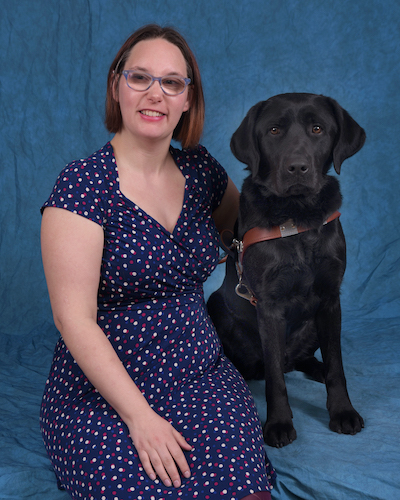Mar 16, 2017 | essay
Blind Lady Vs. Git & Markdown
by Elsa Sjunneson
Pablo, our design and technology director, did not quite know what he’d signed up for when he suggested that he teach me Markdown and GitHub as part of my duties at Fireside.
I didn’t quite know this was coming when I signed up to be the assistant editor either. Before we get into what it’s like to teach a low-vision person how to use Git and Markdown, though, we need to talk about how much I hate technology.
I went through all the same computer classes in middle school that you did if, like me, you were in middle school in the ‘90s. I went through the same high school programming classes, where they tried to teach us html while people napped behind the screens of their giant computers.
I didn’t nap. I just played RPG’s on AOL instead of actually doing my work — because most programming looks a lot like math to me, and math and I do not mix.
I have a learning disability. Algebra doesn’t just seem like another language, it looks like it, and my brain, low vision and all, has a lot of trouble processing it. There’s a point where all the programming languages for computers begin to look a lot like algebra to me. So while my peers went after computer science, hoping to pursue much more lucrative careers than some of them may have even imagined, I fled the computer lab.
I studied history, language, literature, drama, and education. I studied the things that made me happy, the things that fed my soul.
The things that ultimately have little to do with computer programming unless you’re running the website for say, a historical society or a literary magazine.
Oops. See what I did there? I trapped myself in a hell of my own making. Well, not really. Turns out it was okay. But for a moment there, I’d really thought I was screwed.
There I am and Pablo starts saying he’ll need our help migrating the site, and I can feel my flight from the computer lab coming back and biting me in the ass.
I like working with Pablo and Brian, and I trust both of them not to make fun of me for things that I struggle with, or to be frustrated with my slowness with learning things which are for me, intrinsically visual.
So I said yes.
Goddammit.
Yeah, yeah, I know this isn’t programming to people who PROGRAM FOR REAL. Leave me alone. This is as close as I get with a ten-foot pole.
We decide that the best way for me to learn how to use all of these new tools is for me to work on it with Pablo right there, because frankly, screenshares are a nightmare and I can’t read things on them. Not even with my +16 reading glasses.
Fortunately, two out of three Fireside staffers live within a one-hour train ride of each other. So I went into the city and sat down at Pablo’s kitchen table and worked next to him.
It was a… process.
There are parts of markdown that I am going to have to internalize using muscle memory, the way that you create paragraph breaks, for example. There are things that I have to lean close in to the screen for, like setting up links.
But all in all, it hasn’t actually been that bad. There’s probably no perfect system (though I’d love to hear from other blind Git and Markdown users on how to better adapt to using the technology!), but for the most part, I’m learning.
It’s slow, and I did not port over quite as many back issues to our new site as I’d hoped, because my speed is still questionable. I’ll learn. Stuff like this takes time and patience, and fortunately I’m working with people who aren’t going to grade me on my success here. (But I get an A, right Pablo? I get an A on my permanent adult Report Card of Fireside Business?)
[Markdown] works because it’s already using language I’m familiar with. It’s not like I’m adding any new language. It’s using literal punctuation, with different rules than normal, to get things settled and looking pretty on the site.
We were able to make it so that my [GitHub] text editor ([Atom]) had a theme that was accessible to me, and I could change the font to my preferences.
Pablo was patient. I barely swore. Now I’m able to better contribute to the process of making Fireside magazine, and the best part is, I don’t have to panic.
Because when I do fuck something up, Pablo can fix it with a snarky commit reminding me what the appropriate language was, and I can reply back with something even snarkier when I do it the next time.
